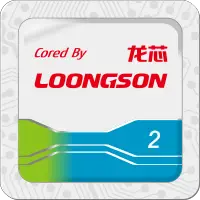| Line 42: | Line 42: | ||
Godson 2 processors can be found in many low end laptops and embedded hardware manufactured by [[Lemote Technology]]. | Godson 2 processors can be found in many low end laptops and embedded hardware manufactured by [[Lemote Technology]]. | ||
| − | + | {{clear}} | |
== Members == | == Members == | ||
<!-- NOTE: | <!-- NOTE: | ||
Revision as of 17:44, 18 March 2017
| Godson 2 | |

| |
| Godson 2 | |
| Developer | Institute of Computing Technology of the Chinese Academy of Sciences, Loongson |
| Manufacturer | STMicroelectronics, SMICS |
| Type | Microprocessors |
| Introduction | 2003 (announced) October 17, 2003 (launch) |
| Architecture | 64-bit MIPS processors |
| ISA | MIPS64 |
| µarch | GS464 |
| Word size | 64 bit 8 octets
16 nibbles |
| Process | 180 nm 0.18 μm , 130 nm1.8e-4 mm 0.13 μm , 90 nm1.3e-4 mm 0.09 μm , 65 nm9.0e-5 mm 0.065 μm
6.5e-5 mm |
| Technology | CMOS |
| Clock | 250 MHz-1,000 MHz |
| Succession | |
| ← | → |
| Godson 1 | Godson 3 |
Godson 2 (龍芯2) is a family of 64-bit MIPS performance desktop processors developed by the Institute of Computing Technology of the Chinese Academy of Sciences (ICT) in 2003. The Godson 2 processors are now developed by Loongson Technology (which was co-founded by ICT) and sold as low-power embedded and desktop processors. The Godson 2 is famous for being the first Chinese developed 64-bit microprocessors as well as the first Chinese processors to break the gigahertz frequency.
Overview
- Main article: GS464 µarch
The Godson 2 microprocessors are designed as a general purpose 64-bit that implements a MIPS64-like instruction set (Note that at the time ICT was not a MIPS licensee). Many improvements were done in Godson over its predecessor such as a wider pipeline capable of fetching and decoding four times as many instructions per cycle.
Initial Godson 2 models were fabricated on a 6-metal 0.18 µm process CMOS technology using automatic placing and routing. Later models enjoyed a series of process shrinks. The Godson 2 has integrated additional features over the years from just a CPU to an entire SoC incorporating a PCI/PCIX controller, memory controller, SPI/UART. Those processors utilized the a HyperTransport bus for the southbridge. Most recent models integrated much of the southbridge on-die as well including PCIe, SATA, and a USB controller as well as multimedia support (GPU, dual display, audio, and media decoders).
Godson 2 processors can be found in many low end laptops and embedded hardware manufactured by Lemote Technology.
Members
| List of Godson-2 Processors | ||||||||||||
|---|---|---|---|---|---|---|---|---|---|---|---|---|
| Model | Launched | Process | Frequency | Power | ||||||||
| 2A | 180 nm 0.18 μm 1.8e-4 mm | 0.25 GHz 250 MHz 250,000 kHz | 3 W 3,000 mW 0.00402 hp 0.003 kW | |||||||||
| 2B | 17 October 2003 | 180 nm 0.18 μm 1.8e-4 mm | 0.3 GHz 300 MHz 300,000 kHz | 3 W 3,000 mW 0.00402 hp 0.003 kW | ||||||||
| 2B1 | March 2004 | 180 nm 0.18 μm 1.8e-4 mm | 0.4 GHz 400 MHz 400,000 kHz | 4 W 4,000 mW 0.00536 hp 0.004 kW | ||||||||
| 2C | 28 September 2004 | 180 nm 0.18 μm 1.8e-4 mm | 0.5 GHz 500 MHz 500,000 kHz | 5 W 5,000 mW 0.00671 hp 0.005 kW | ||||||||
| 2D | 2006 | 130 nm 0.13 μm 1.3e-4 mm | 0.7 GHz 700 MHz 700,000 kHz | 5 W 5,000 mW 0.00671 hp 0.005 kW | ||||||||
| 2D1 | 2006 | 130 nm 0.13 μm 1.3e-4 mm | 0.8 GHz 800 MHz 800,000 kHz | 6 W 6,000 mW 0.00805 hp 0.006 kW | ||||||||
| 2E | 18 March 2006 | 90 nm 0.09 μm 9.0e-5 mm | 1 GHz 1,000 MHz 1,000,000 kHz | 7 W 7,000 mW 0.00939 hp 0.007 kW | ||||||||
| 2F | June 2008 | 90 nm 0.09 μm 9.0e-5 mm | 0.8 GHz 800 MHz 800,000 kHz | 5 W 5,000 mW 0.00671 hp 0.005 kW | ||||||||
| 2G | November 2010 | 65 nm 0.065 μm 6.5e-5 mm | 1 GHz 1,000 MHz 1,000,000 kHz | 3 W 3,000 mW 0.00402 hp 0.003 kW | ||||||||
| 2H | March 2011 | 65 nm 0.065 μm 6.5e-5 mm | 1 GHz 1,000 MHz 1,000,000 kHz | 10 W 10,000 mW 0.0134 hp 0.01 kW | ||||||||
| Count: 10 | ||||||||||||
| designer | Institute of Computing Technology of the Chinese Academy of Sciences + and Loongson + |
| first announced | 2003 + |
| first launched | October 17, 2003 + |
| full page name | loongson/godson 2 + |
| instance of | microprocessor family + |
| instruction set architecture | MIPS64 + |
| main designer | Institute of Computing Technology of the Chinese Academy of Sciences + |
| manufacturer | STMicroelectronics + and SMICS + |
| microarchitecture | GS464 + |
| name | Godson 2 + |
| process | 180 nm (0.18 μm, 1.8e-4 mm) +, 130 nm (0.13 μm, 1.3e-4 mm) +, 90 nm (0.09 μm, 9.0e-5 mm) + and 65 nm (0.065 μm, 6.5e-5 mm) + |
| technology | CMOS + |
| word size | 64 bit (8 octets, 16 nibbles) + |